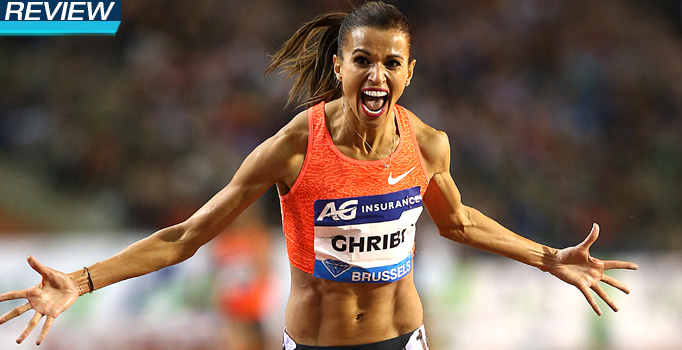Habiba Ghribi’s main aim was to simply better her own world-leading mark in the 3000m steeplechase as she sought to gain redemption after missing gold at the IAAF World Championships, Beijing 2015.
But she didn’t just set a world lead; she set a meeting record, an IAAF Diamond League record and an African record, going to second on the world all-time list.
One of the pace makers led the field through the first 1000m in 3:03.19 with Ghribi biding her time behind world champion Hyvin Jepkemoi and fellow Kenyan Virginia Nyambura.
The pace remained constant through the second kilometre as Nyambura led the field with the clock reading 6:06.49. Ethiopia’s Hiwot Ayalew took a turn in the lead, but then seemed reluctant to force the pace for the last few laps.
That’s when Ghribi took matters into her own hands. The Tunisian hit the front and began to pull away from the rest of the field. She was away and clear on the last lap and charged through the line in 9:05.36, the fastest time in the world since Gulnara Galkina set the world record in 2008.
Outside of the World Championships, it was just the second race of Ghribi’s season. But despite winning both of those, she didn’t earn enough points to catch Nyambura in the Diamond Race.
Jepkemoi held on for second place in a PB of 9:10.15 while Assefa came through on the last lap to take third in 9:12.63.
“In the beginning I didn’t want to waste too much energy,” said Ghribi. “I felt really good and capable of beating my PB, but to get the national record and the meeting record is just fantastic. Tonight everything was perfect.”
Sifan Hassan had hoped to challenge the world record in the mile, but the European champion fell six seconds short of her target and was passed in the last 100 metres.
World indoor 800m champion Chanelle Price did the early pace making, passing 400m in 1:02.61 and 800m in 2:05.69. Once she had dropped out, Kipyegon challenged Hassan for the lead as the pace dropped on the third lap.
Hassan regained the lead after passing the bell, but Kipyegon kicked again in the closing stages and finished one-and-a-half seconds ahead of her rival in 4:16.71, breaking the African record with the fastest time in the world for 19 years.
Hassan held on for second with a national record of 4:18.20. As was the case in Monaco earlier in the year, USA’s Shannon Rowbury beat compatriot Jenny Simpson, 4:22.10 to 4:22.18.
The third world lead of the night came in the men’s 5000m.
The Diamond Race standings in this event were so open that whoever crossed the line first in Brussels would take the series title. World silver medallist Caleb Ndiku was perhaps the marginal favourite coming into the race and he was in contention for most of it.
Vincent Rono took the field through 3000m in 7:47.88 but the pace remained constant after he dropped out. Five men were still in contention at the bell, but Ndiku was the first of those to fade, seemingly giving up on the back straight.
World junior champion Yomif Kejelcha kicked hard with 200 metres to go and was challenged by fellow Ethiopian and world bronze medallist Hagos Gebrhiwet. But, unlike at the World Championships, Kejelcha didn’t let his older compatriot pass him on this occasion and held on for the win in a world-leading 12:53.98.
Gebrhiwet clocked 12:54.70 in second, while Abdalaati Iguider (12:59.25) and Thomas Longosiwa (12:59.72) also dipped inside the 13-minute barrier.
In the men’s 800m, Adam Kszczot held off strong challenges from Nijel Amos and Amel Tuka to win in 1:45.12. Amos was second in 1:45.25, 0.2 ahead of Tuka.
World 1500m champion Asbel Kiprop was well beaten down in 10th, clocking 1:47.09, one place ahead of world 1500m silver medallist Elijah Manangoi.
Jon Mulkeen for the IAAF and the IAAF Diamond League









